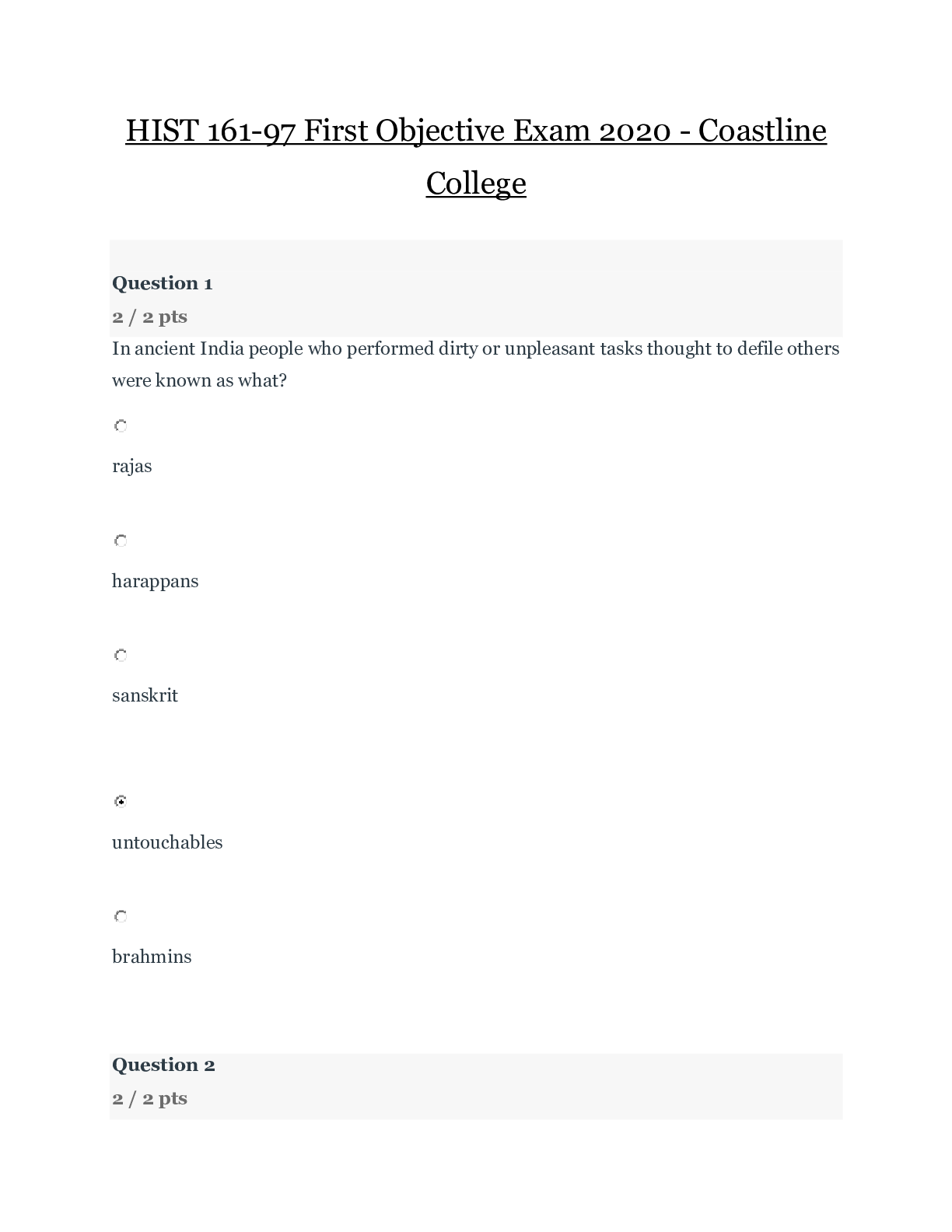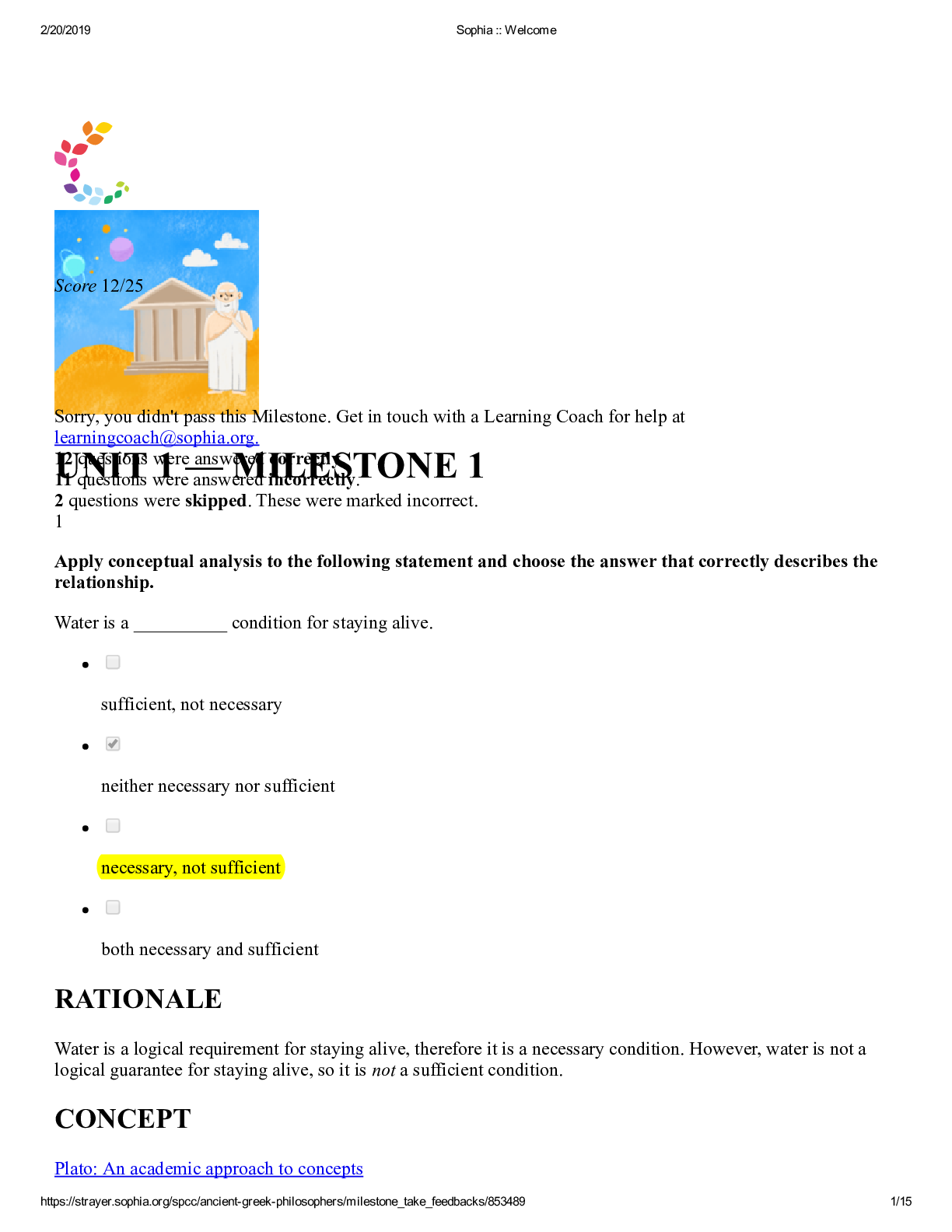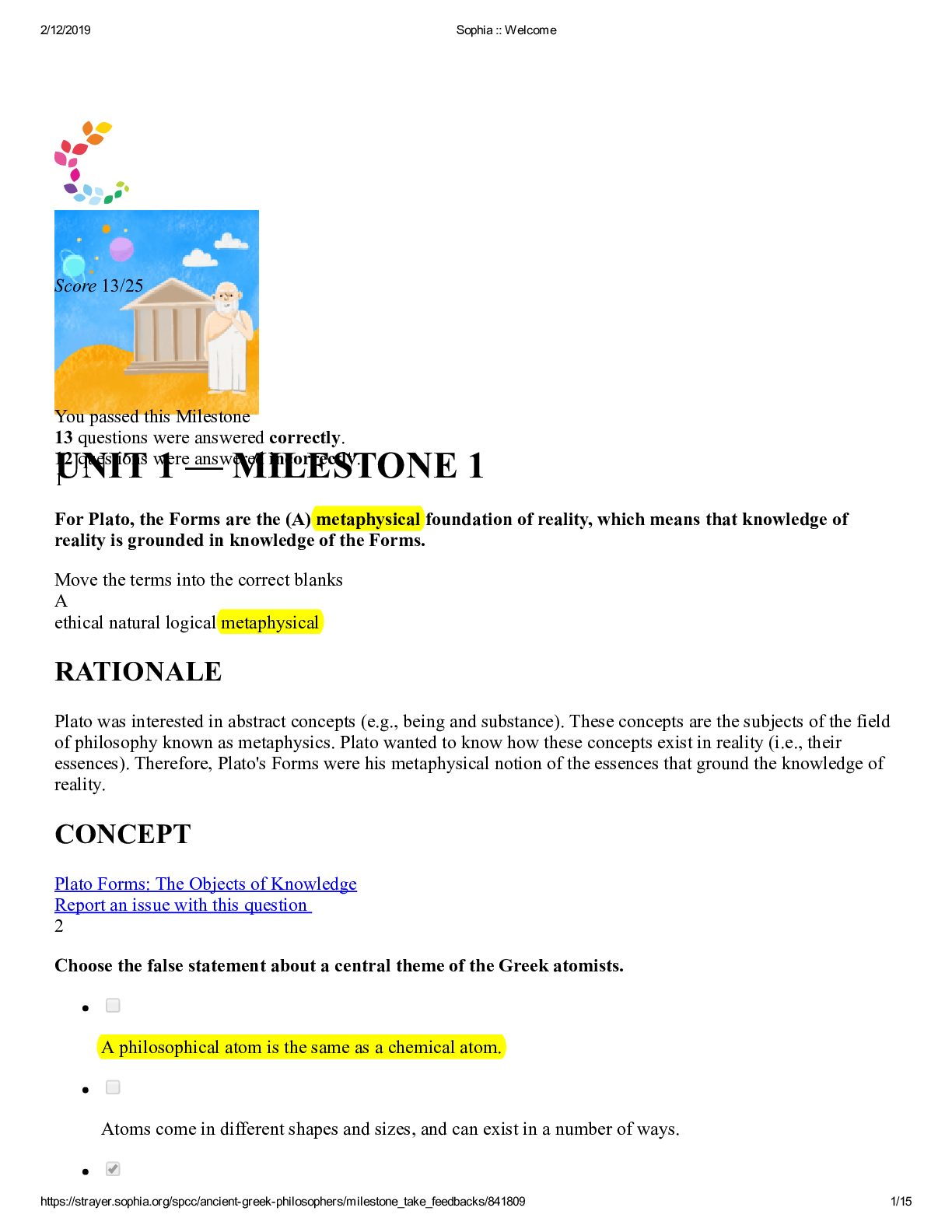Philosophy > EXAM > SOPHIA UNIT 1 Philosophy_Milestone 1 Exam 2020 - DeVry University | SOPHIA UNIT 1 Philosophy_Milesto (All)
SOPHIA UNIT 1 Philosophy_Milestone 1 Exam 2020 - DeVry University | SOPHIA UNIT 1 Philosophy_Milestone 1 Exam 2020
Document Content and Description Below
2/12/2019 Sophia :: Welcome https://strayer.sophia.org/spcc/ancientgreekphilosophers/milestone_take_feedbacks/841809 1/15 UNIT 1 — MILESTONE 1 Score 13/25 You passed this Milestone 13 quest... ions were answered correctly. 12 questions were answered incorrectly. 1 F or Plato, the Forms are the (A) metaphysical foundation of reality, which means that knowledge of reality is grounded in knowledge of the Forms. Move the terms into the correct blanks Aet hical natural logical metaphysical RATIONALE Plato was interested in abstract concepts (e.g., being and substance). These concepts are the subjects of the field of philosophy known as metaphysics. Plato wanted to know how these concepts exist in reality (i.e., their essences). Therefore, Plato's Forms were his metaphysical notion of the essences that ground the knowledge of reality. CONCEPT Plato Forms: The Objects of Knowledge Report an issue with this question 2 C hoose the false statement about a central theme of the Greek atomists. A philosophical atom is the same as a chemical atom. Atoms come in different shapes and sizes, and can exist in a number of ways.2/12/2019 Sophia :: Welcome https://strayer.sophia.org/spcc/ancientgreekphilosophers/milestone_take_feedbacks/841809 2/15 Everything that exists is either an atom or a collection of atoms. All reality is composed of atoms in a void. RATIONALE The atomists believed that everything that exists is either an atom, or a collection of atoms. They also believed that all matter and phenomena are the result of different configurations of atoms of different shapes and sizes. However, a philosophical atom is not the same as a chemical atom. To the atomists, a philosophical atom was an indivisible entity. Chemical atoms, as science has demonstrated, can be divided into smaller parts. CONCEPT The Atomistic Worldview Report an issue with this question 3 N ancy is a cashier at a grocery store. A boy from her school, who she knows is underage, attempts to buy beer. Nancy hesitates before completing the transaction. According to Aristotle’s ethics, which question should Nancy ask herself? Are there possible consequences of this action that could harm me? What kind of person should I be? How can I reach a compromise? Why is this action right, and why is it wrong? RATIONALE Aristotelian ethics are primarily concerned with character. As a result, Nancy should ask herself “What kind of person should I be?” rather than “How should I act?” According to Aristotelian ethics, actions are evaluated based on how they inform your character. Therefore, Nancy must determine what kind of person she wants to be and what virtues she wants to cultivate, and then act accordingly. CONCEPT Applying Aristotle's Ethics2/12/2019 Sophia :: Welcome https://strayer.sophia.org/spcc/ancientgreekphilosophers/milestone_take_feedbacks/841809 3/15 Report an issue with this question 4 In the Apology, Socrates states that a good person does what he knows to be right despite __________. negative personal consequences the wisdom of the gods the laws of man risking fame and fortune RATIONALE The Apology is Plato's transcription of the defense Socrates presented at his trial on charges of "denying the gods" and "corrupting the youth of Athens." In it, Socrates asserts that he does not fear death, because he has lived as he believed was right. To Socrates, it is more important to live rightly than to avoid death and other negative personal consequences. CONCEPT The Apology: A Defense of Philosophy Report an issue with this question 5 W hat kind of a thing is an orchid? It is a type of flower. What distinguishes an orchid from other flowers? The female and male parts of an orchid are fused together. According to Aristotle, answering both of these questions reveals the __________ of an orchid. ontology genus essence organization2/12/2019 Sophia :: Welcome https://strayer.sophia.org/spcc/ancientgreekphilosophers/milestone_take_feedbacks/841809 4/15 RATIONALE According to Aristotle, we can discover and describe essences by identifying a genus and a differentia. The genus (in this example, a flower) tells us what kind of thing an orchid is. The differentia tells us what sets an orchid apart from other things of the same kind. CONCEPT Aristotle on What There Is Report an issue with this question 6 F red believes that the death penalty is ethically wrong. After watching a documentary about capital punishment, he discussed his belief with his wife. Choose the statement from Fred that is NOT consistent with his belief. “If someone harmed a member of our family, I believe he would deserve death.” “No matter the offense, the state should never use death as punishment.” “The threat of the death penalty does not deter criminals from committing crimes.” “Humans must not play God by deciding when someone’s life should end.” RATIONALE To live philosophically, a person must examine his or her beliefs to ground them in knowledge, and then act according to those beliefs. By making an exception to his position on the death penalty for people who harmed a member of his family, Fred displays an inconsistent philosophical worldview. CONCEPT Philosophical Analysis as a Way of Life Report an issue with this question 7 C hoose the example that best demonstrates a central tenet of Stoicism. Stephanie is a good nurse because she is skillful and always remains composed.2/12/2019 Sophia :: Welcome https://strayer.sophia.org/spcc/ancientgreekphilosophers/milestone_take_feedbacks/841809 5/15 Carlene is devastated when her outdoor party is interrupted by a thunderstorm. Mr. Donovan insists that he begin each morning with pastry and a cup of sweet tea. Bob is such a rabid Cubs fan that it isn’t fun to watch a baseball game with him. RATIONALE Stoicism is a philosophy that encourages people to focus only on what they can control (e.g., their desires, emotions, and reactions). Because Stoicism focuses on eliminating desires, and emphasizes control of emotions, it leads people to perform their assigned jobs (or roles) skillfully and dispassionately. CONCEPT Stoicism: The Ethics of Dispassion Report an issue with this question 8 C hoose the statement that describes a central theme of Parmenidean metaphysics. The world is composed of linked opposites. The opinions of mortals are universally reliable. Mortal and divine knowledge can be joined. The universe consists of one, unchanging entity. RATIONALE Parmenidean metaphysics includes the concept of "substance monism" — the belief that all reality is one object. This object is called the “whatis.” The "whatis" is eternal and unchanging. None of the other statements represent Parmenidean metaphysics. CONCEPT Parmenides and the Doctrine of Permanence Report an issue with this question 92/12/2019 Sophia :: Welcome https://strayer.sophia.org/spcc/ancientgreekphilosophers/milestone_take_feedbacks/841809 6/15 Evaluate the argument and determine which answer option describes it. All teachers are robots. Cynthia is a teacher. Therefore, Cynthia is a robot. inductive, weak, uncogent deductive, invalid, sound deductive, valid, unsound inductive, strong, cogent RATIONALE Because the inferential claim in this example is one of logical certainty, and is about definition and form rather than cause and effect, this is a deductive argument. Since a case in which the premises are true and the conclusion is false cannot exist, this argument is valid. However, this argument is unsound because the first premise is false: Not all teachers are robots. CONCEPT Evaluating an Argument in Action Report an issue with this question 10 Apply conceptual analysis to the following statement and choose the answer that correctly describes the relationship. Being a good parent is a ______________ condition for having a child. neither necessary nor sufficient sufficient, not necessary necessary, not sufficient2/12/2019 Sophia :: Welcome https://strayer.sophia.org/spcc/ancientgreekphilosophers/milestone_take_feedbacks/841809 7/15 both necessary and sufficient RATIONALE Being a good parent is not a necessary condition, or logical requirement, for having a child because there are people who have children who aren't good parents. In order to be a parent, a person must have a child. That makes being a good parent a sufficient, but not a necessary condition for having a child. CONCEPT Plato: An academic approach to concepts Report an issue with this question 11 Select the statement upon which Plato and Aristotle would disagree. Essences exist and are genuine entities. Reasoning and logic are key to finding truth. Essences exist independently of the world. Truth is important above all else. RATIONALE Plato and Aristotle agree on all of these points except for the statement that essences exist independently of the world. This was Plato's belief, but Aristotle believed that essences exist only within worldly objects, and nowhere else. CONCEPT Plato vs. Aristotle: The Mathematician or the Biologist Report an issue with this question 12 (A) Metaphysics is the branch of philosophy that examines the ultimate nature of reality. Move the terms into the correct blanks AN atural Philosophy Cosmology Metaphysics Epistemology2/12/2019 Sophia :: Welcome https://strayer.sophia.org/spcc/ancientgreekphilosophers/milestone_take_feedbacks/841809 8/15 RATIONALE Metaphysics is the branch of philosophy that is concerned with discovering and describing the ultimate nature of reality. Cosmology is the study of the universe in its totality, natural philosophy examines nature and the universe, and epistemology analyzes and defends concepts of knowledge. CONCEPT What is Philosophy? Report an issue with this question 13 Read the following statement by Socrates: “And he attains to the purest knowledge of them who goes to each with the mind alone, not introducing or intruding in the act of thought sight or any other sense together with reason, but with the very light of the mind in her own clearness searches into the very truth of each; he who has got rid, as far as he can, of eyes and ears and, so to speak, of the whole body, these being in his opinion distracting elements which when they infect the soul hinder her from acquiring truth and knowledge . . .” Outline Socrates argument in this text and choose the sentence that accurately reflects it. The physical body and the soul are both necessary in order to find truth. Death prevents the philosopher from finding the answers he most wants to know. Life has no intrinsic value; only a good life, welllived, has value for the gods. It is the mind, not the senses, that can know the essence of a thing. RATIONALE In this selection from the Phaedo, Socrates argues that the philosopher is not concerned with the world of the senses, but with the soul. When Socrates says "And he attains to the purest knowledge of them who goes to each with the mind alone," he asserts that pure knowledge is readily acquired by the mind when it is separated from the body. The senses (e.g., eyes and ears) are a distraction that "hinder her from acquiring truth and knowledge . . .” Therefore, death (which Socrates views as the end of the life of the body, not of the soul) enables the philosopher to find the answers he or she seeks. CONCEPT The Apology — Socrates' Arguments Report an issue with this question 142/12/2019 Sophia :: Welcome https://strayer.sophia.org/spcc/ancientgreekphilosophers/milestone_take_feedbacks/841809 9/15 A Stoic avoids looking for good in external things and recognizes that value __________. has little to do with ethics is determined by intrinsic personality traits can be found in every living entity lies in our judgment of the world RATIONALE Stoicism is a philosophical approach that encourages people to focus only on what they can control (e.g., their desires, emotions, reactions, and judgments of the world). They should not be concerned by things that are beyond their control. Stoicism directs people to focus on their internal values rather than external rewards. CONCEPT Stoicism: The Ethics of Dispassion Report an issue with this question 15 Select the false statement about the Crito. Athens performed its end of the Social Contract; Socrates was required to do the same. Following the advice of experts is more ethical than appealing the majority. The Social Contract made it unethical for Socrates to escape his punishment. Socrates argued that civil disobedience was an obligation for intellectuals and philosophers. RATIONALE In the Crito, Socrates argues against the concept of civil disobedience. In an imagined dialogue between him and Athens, Socrates says "But he who has experience of the manner in which we order justice and administer the state, and still remains, has entered into an implied contract that he will do as we command him." In other2/12/2019 Sophia :: Welcome https://strayer.sophia.org/spcc/ancientgreekphilosophers/milestone_take_feedbacks/841809 10/15 words, a person who has benefited from the protection and privileges provided by a state, and who has not sought to change its laws or leave its jurisdiction, must accept its judgement. This is an early expression of the concept of the Social Contract. CONCEPT The Crito: The Duties of the Social Contract Report an issue with this question 16 According to Plato’s doctrine of the Forms, is Leonardo da Vinci's painting, the Mona Lisa, beauty? No, because it only participates in the Form of Beauty. Yes, if each individual applies his or her concept of beauty to the painting. No, because not everyone agrees that it represents that which is beautiful. Yes, if beauty represents all that is good in Platonic Heaven. RATIONALE Plato's doctrine of the Forms states that the essences of all things, including beauty, exist in Platonic Heaven. Worldly objects are what they are because they participate in their corresponding Form. The Mona Lisa is a beautiful painting because it participates, or imitates, the Form of Beauty. It is not, in itself, Beauty. CONCEPT Applying Plato's Metaphysics Report an issue with this question 17 Heraclitus’ approach to reality was secular. He believed that a Logos governed all things. It did so through the Unity of Opposites, and the fact that all things change over time, which he called the (A) Doctrine of Flux . Move the terms into the correct blanks APa radoxes of Zeno Doctrine of Flux Philosophical Atom Parmenidean Theory RATIONALE Heraclitus developed the Doctrine of Flux, and defined flux as "continuous change." The doctrine maintains that everything is impermanent and in a constant state of change.2/12/2019 Sophia :: Welcome https://strayer.sophia.org/spcc/ancientgreekphilosophers/milestone_take_feedbacks/841809 11/15 CONCEPT Heraclitus and the Doctrine of Impermanence Report an issue with this question 18 The value of the Socratic Method lies in showing students how to __________ themselves, rather than having it dictated to them. create an argument explain rhetoric gain knowledge evaluate an opinion RATIONALE The Socratic Method is a pedagogical method in which a teacher asks questions to which the student knows the answers, thereby leading him or her to the truth. The Method's value lies in showing students how to use what they know to gain additional knowledge. CONCEPT The Socratic Approach Report an issue with this question 19 Select the statement most likely to have been made by Aristotle. “The world is unchanging and eternal, which conflicts with the illusion that life is neither.” “What is true is always true, independent of wisdom, language, or knowledge.” “New things do not come into existence; rather, things change their organization.”2/12/2019 Sophia :: Welcome https://strayer.sophia.org/spcc/ancientgreekphilosophers/milestone_take_feedbacks/841809 12/15 “We must begin with the world we encounter every day, rather than with the abstraction of metaphysics.” RATIONALE The statement that "We must begin with the world we encounter every day" reflects Aristotle's philosophical approach. To Aristotle, all knowledge is grounded in human experience, and flows from empirical evidence. The statements which involve change are reflective of Parmenides and the Atomists. The statement about truth existing independent of wisdom, language, or knowledge is reflective of Plato's philosophy. CONCEPT Aristotle: The Dissection of Reality Report an issue with this question 20 When Socrates is asked about suicide in the Phaedo, he replies that ______. our bodies belong to the gods it is man’s choice to live or to die philosophers must always be prepared for death the body is eternal and cannot die RATIONALE In the Phaedo, Socrates contends that suicide is immoral. He argues that the bodies of men belong to the gods, and that only the gods can choose to end a life. CONCEPT The Phaedo: The Death of Socrates Report an issue with this question 21 Choose the false statement about Aristotle’s metaphysics. In order for a statement to be true, one must state that an object exists, what the object is, and the state in which it exists.2/12/2019 Sophia :: Welcome https://strayer.sophia.org/spcc/ancientgreekphilosophers/milestone_take_feedbacks/841809 13/15 Humans have the natural capacity to know many things without divine revelation or empirical evidence. Examining the nature of being, and knowing what kinds of things exist, is a sensible beginning point for philosophical inquiry. The distinction between form and matter is purely conceptual — one does not, and cannot, exist without the other. RATIONALE Aristotle would agree with all of these statements except the suggestion that we can have knowledge without empirical evidence. To Aristotle, all knowledge is grounded in human experience and flows from empirical evidence. CONCEPT Aristotle on What There Is Report an issue with this question 22 According to Aristotle’s ethics, virtues should be pursued by __________. finding a rational mean between two extremes defining what is true determining the purest form of action thinking abstractly RATIONALE Aristotle's Doctrine of the Mean states that virtue must be cultivated as a rational mean between extremes. For example, the virtue of courage is found between the vices of cowardice and foolhardiness. CONCEPT Aristotle's Highest Good Report an issue with this question 232/12/2019 Sophia :: Welcome https://strayer.sophia.org/spcc/ancientgreekphilosophers/milestone_take_feedbacks/841809 14/15 Choose the false statement about the metaphysical tenets of Plato’s Doctrine of the Forms. There is no knowledge because everything is in a state of transition and nothing is true. Plato’s Doctrine of the Forms grounds knowledge and being. Worldly objects imitate the more real, genuine Forms of objects. The intellectual realm in which Forms exist is unchanging and eternal. RATIONALE The statement that "There is no knowledge because everything is in a state of transition and nothing is true" is the opposite of Plato's metaphysical beliefs. His Doctrine of the Forms argues that all worldly objects are related to their essences (i.e., Forms), which are real, unchanging, perfect entities that exist in an intellectual realm called Platonic Heaven. The Forms provide the basis for all knowledge. CONCEPT Plato Forms: The Foundations of Being Report an issue with this question 24 Perhaps the most important way in which Socrates changed the course of Western philosophy was by focusing on __________. natural philosophy cosmology martyrdom moral philosophy RATIONALE2/12/2019 Sophia :: Welcome https://strayer.sophia.org/spcc/ancientgreekphilosophers/milestone_take_feedbacks/841809 15/15 Ethics and morality were the primary focus of Socrates's philosophical inquiry. He is considered to have been the first "moral philosopher," who was deeply interested in how to determine right and wrong. CONCEPT Socrates: The Father of Western Philosophy Report an issue with this question 25 “It is my belief that everything in the cosmos is made of water.” The ancient philosopher most likely to have made this statement was (A) Thales . Move the terms into the correct blanks AEm pedocles Thales Pythagoras Protagoras RATIONALE Thales was the PreSocratic philosopher who believed that everything in the cosmos was made of water. Thales and his pupils, Anaximander and Anaximenes, sought to discover the nature of the cosmos. CONCEPT Cosmology and the First Philosophers Report an issue with this question © 2019 SOPHIA Learning, LLC. SOPHIA is a registered trademark of SOPHIA Learning, LLC. About Contact Us Privacy Policy Terms of Use [Show More]
Last updated: 1 year ago
Preview 1 out of 15 pages
Instant download
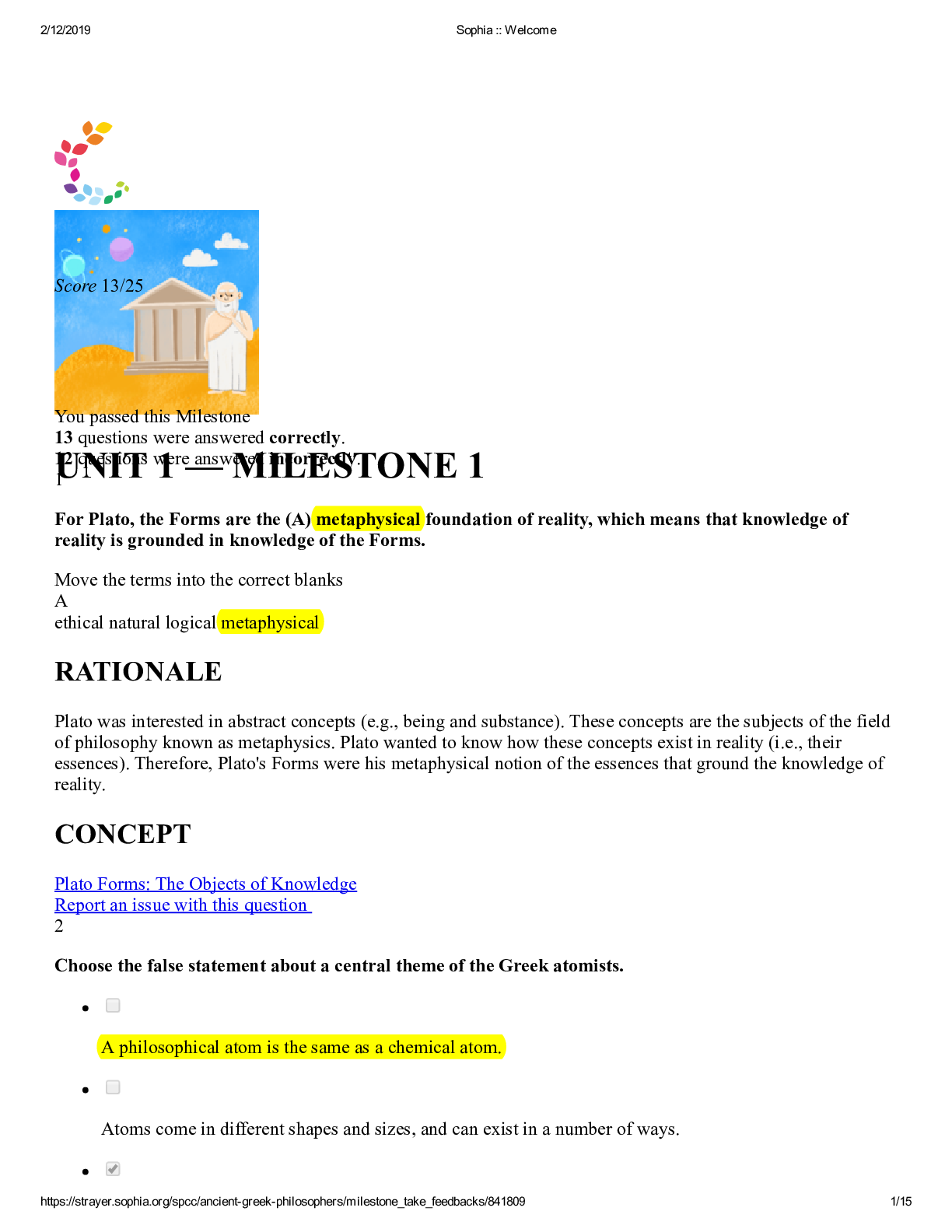
Buy this document to get the full access instantly
Instant Download Access after purchase
Add to cartInstant download
Reviews( 0 )
Document information
Connected school, study & course
About the document
Uploaded On
Sep 06, 2020
Number of pages
15
Written in
Additional information
This document has been written for:
Uploaded
Sep 06, 2020
Downloads
0
Views
35

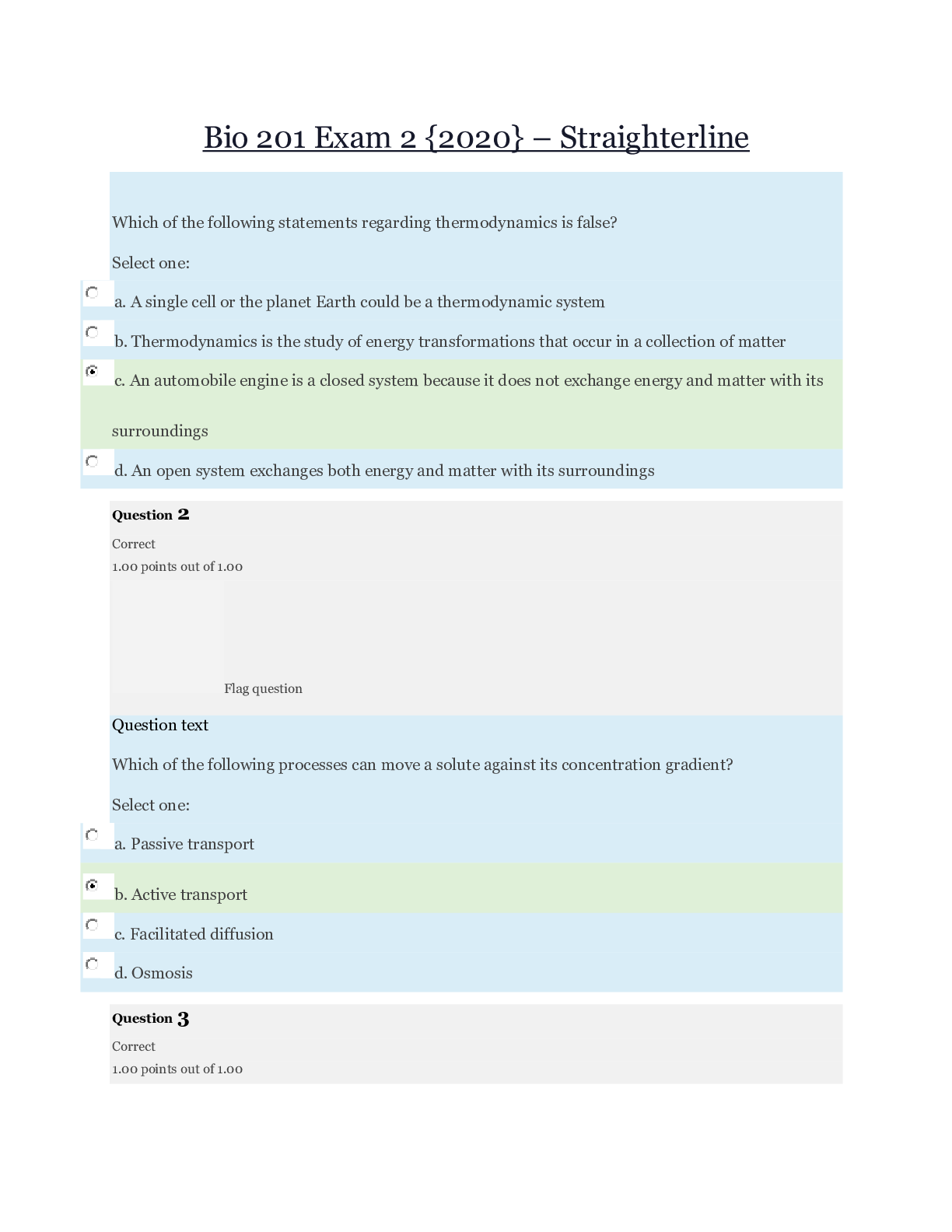
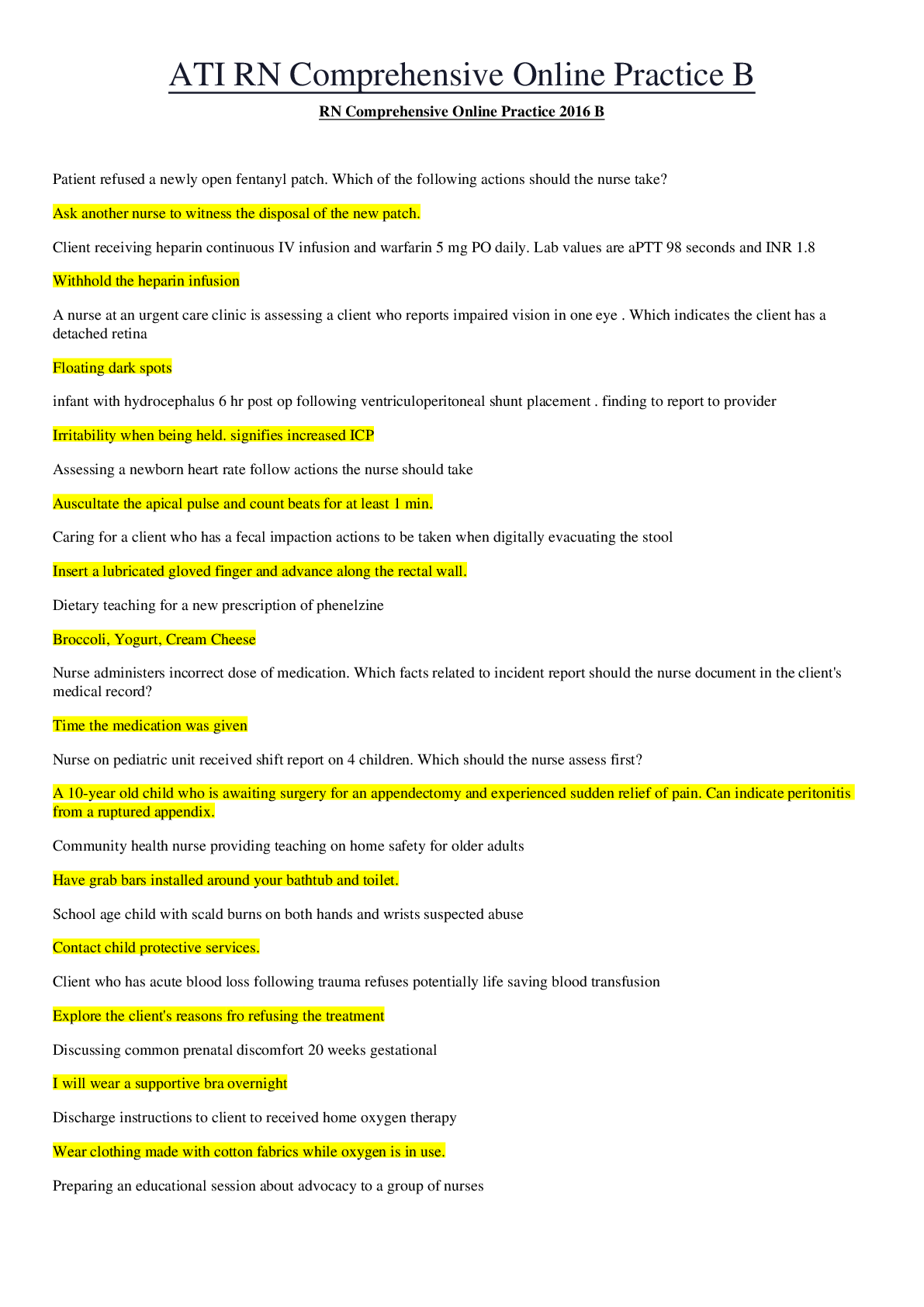
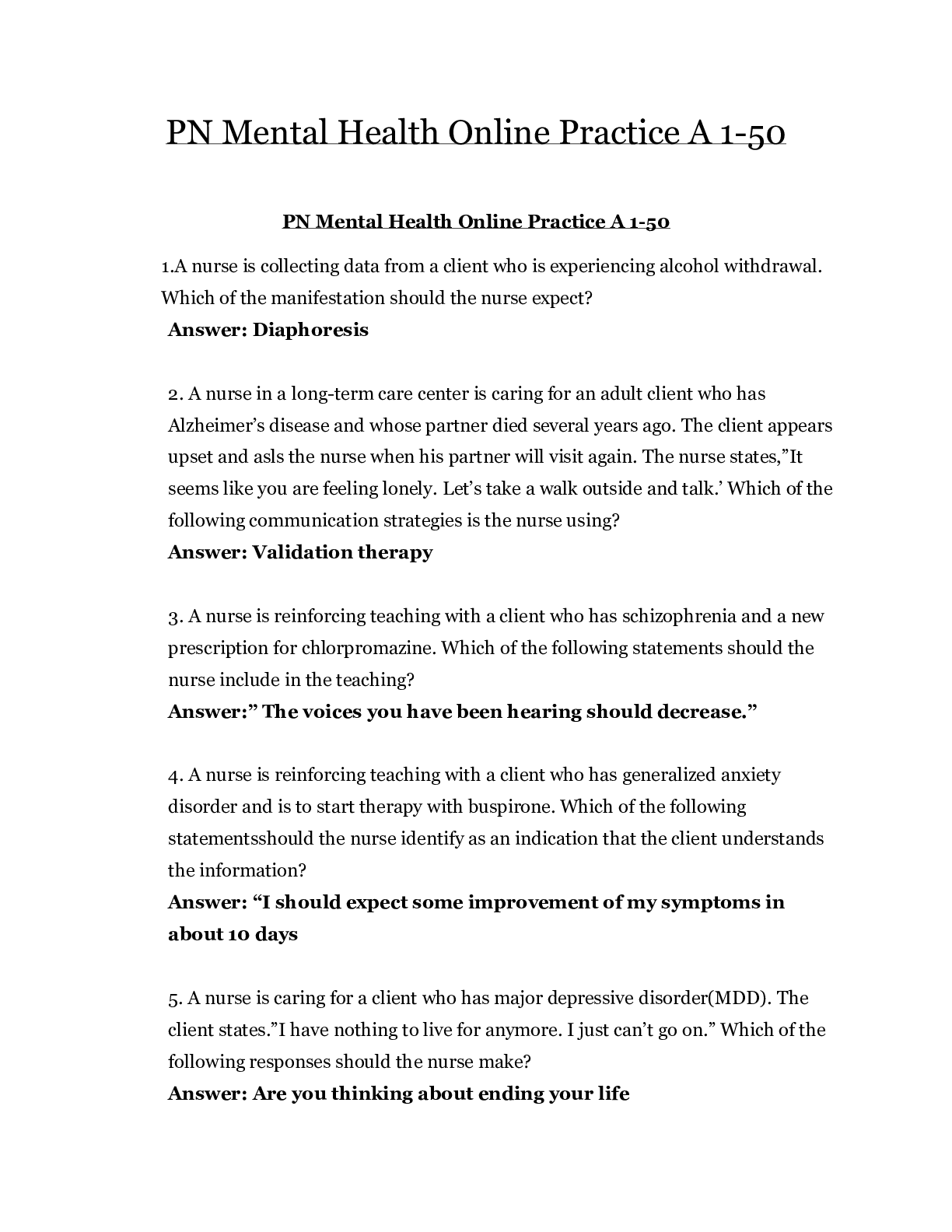
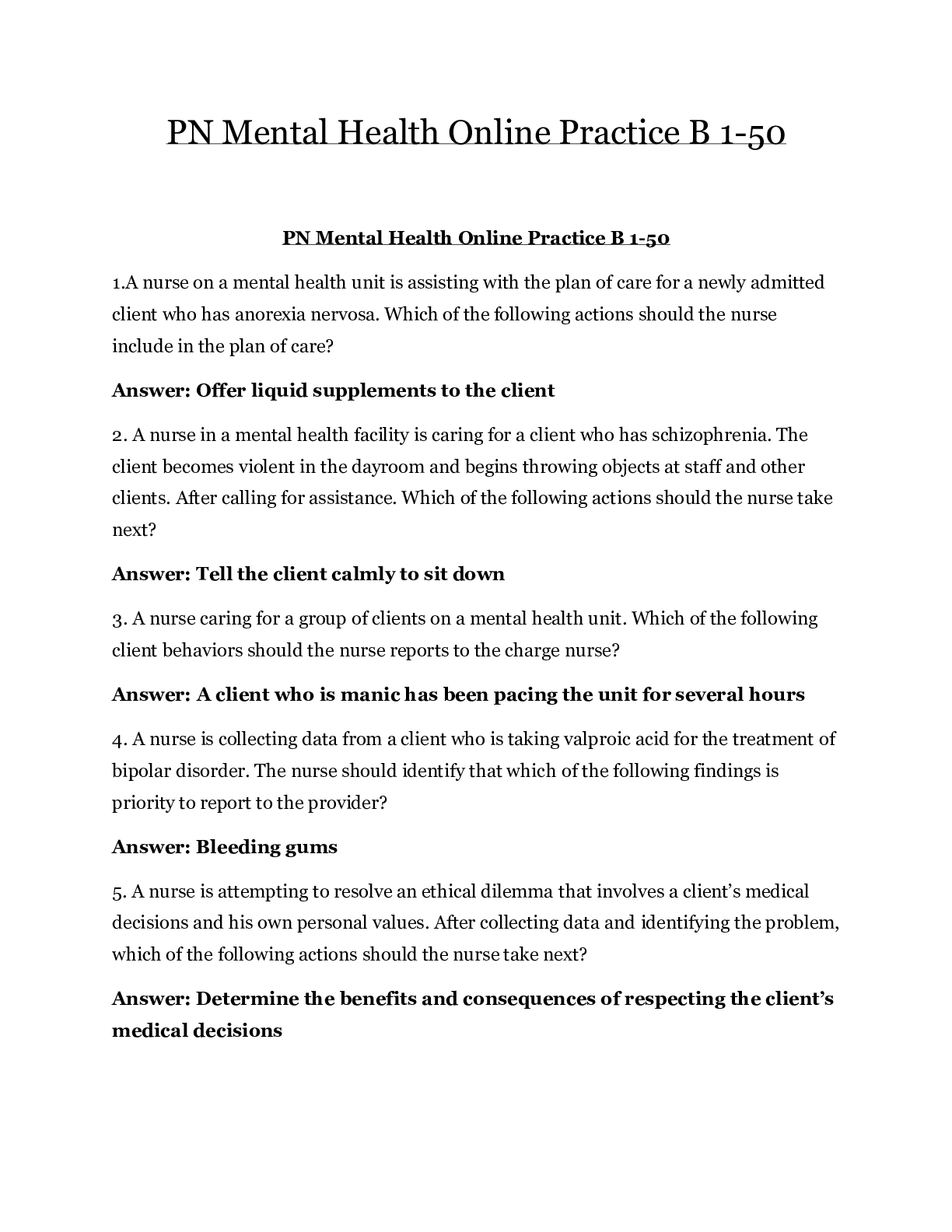
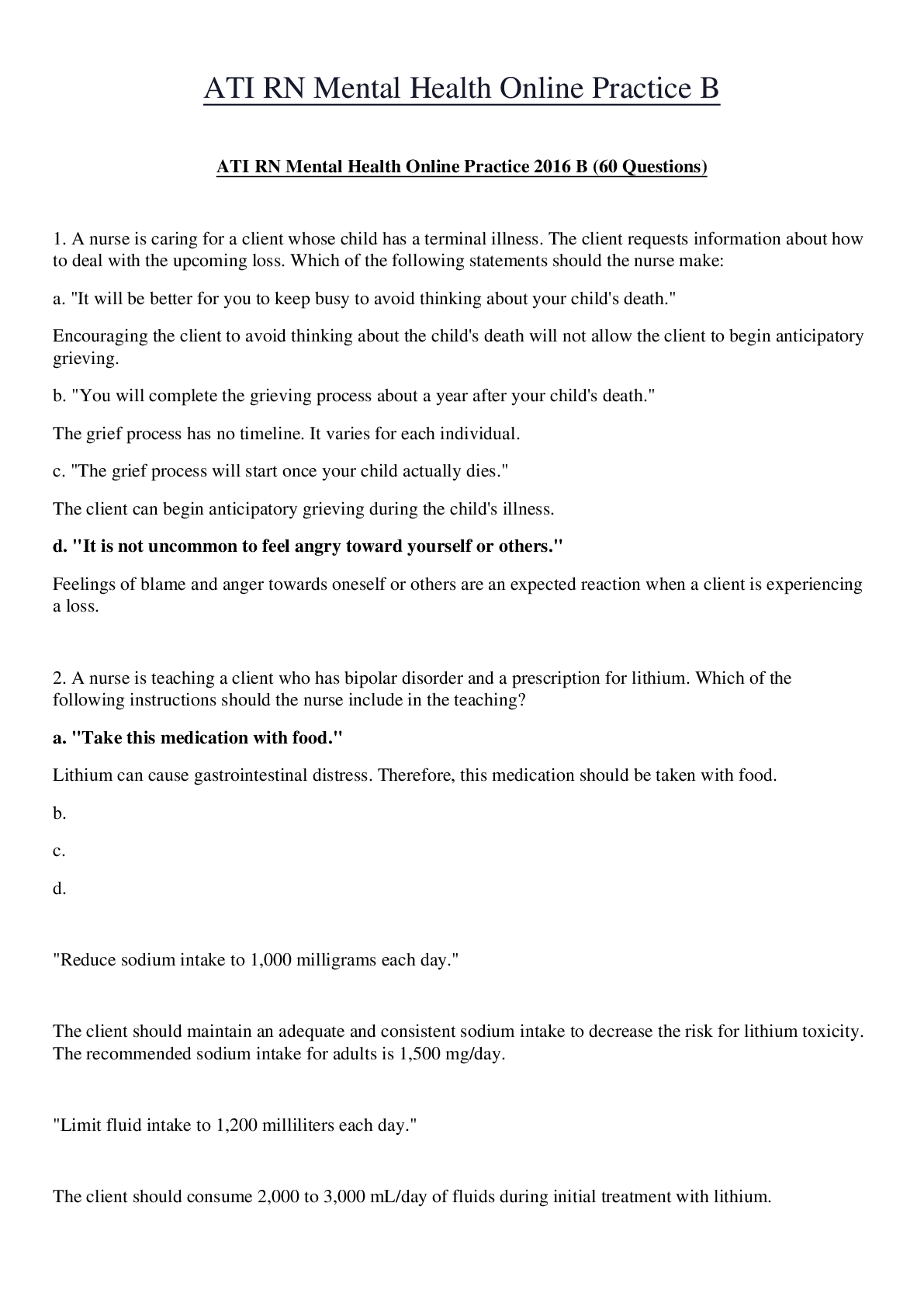

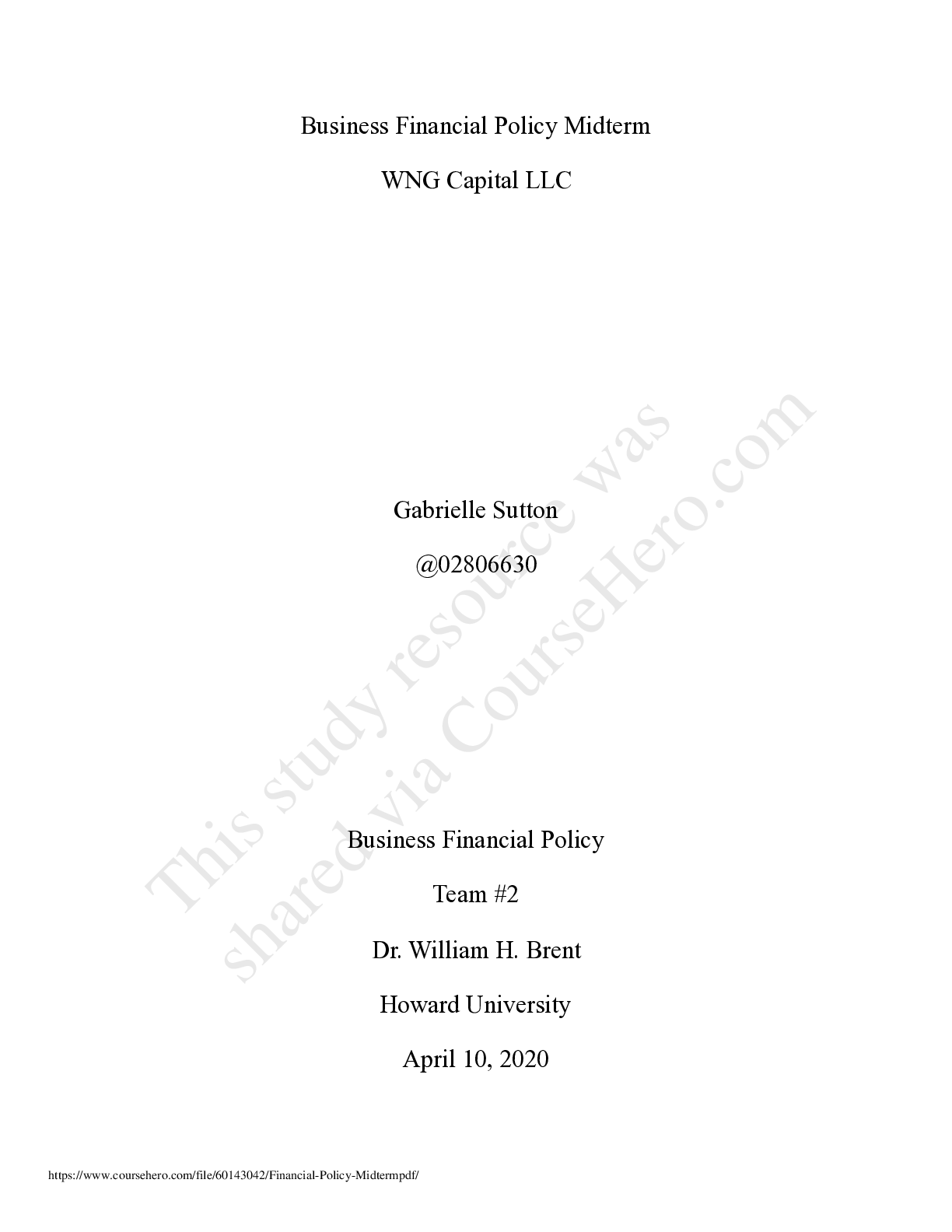

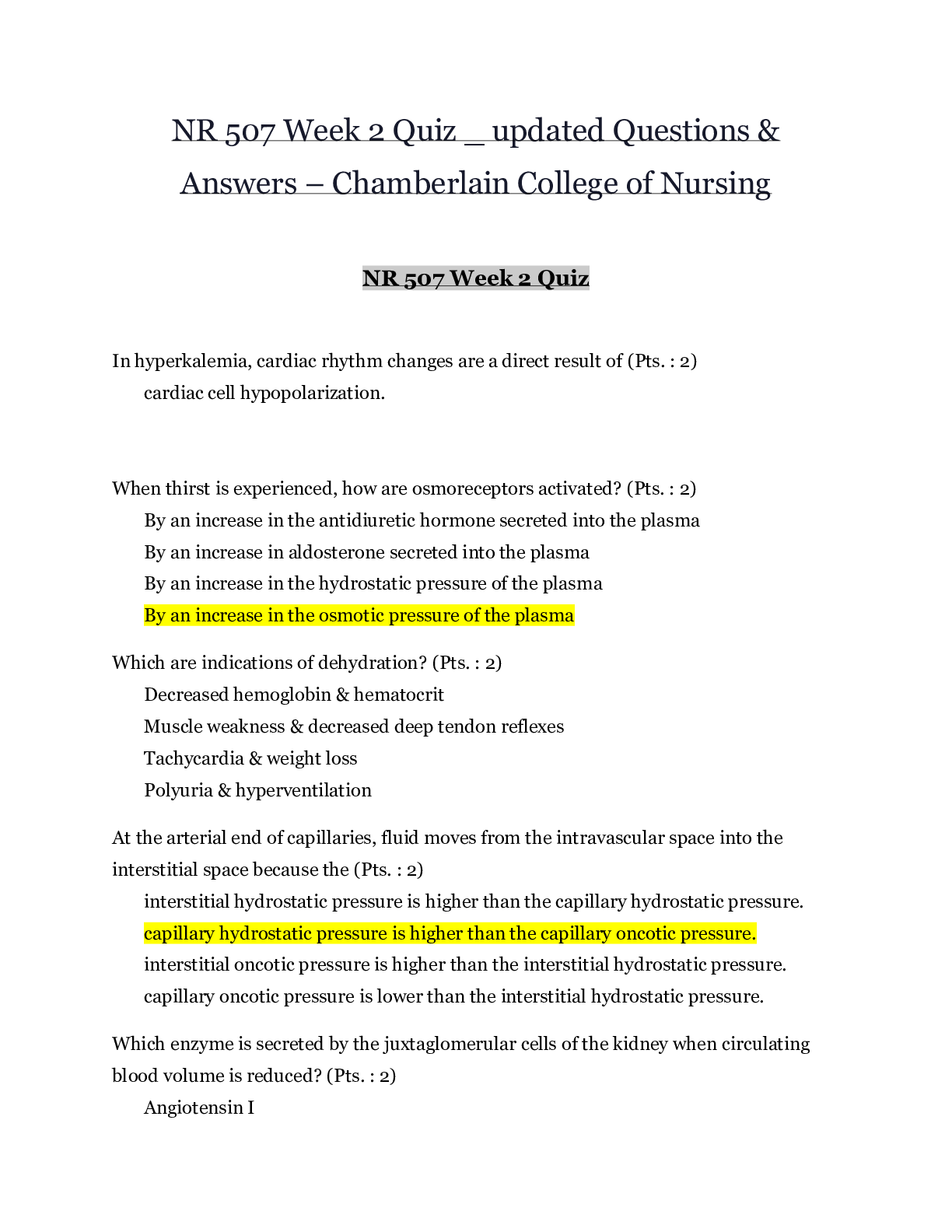
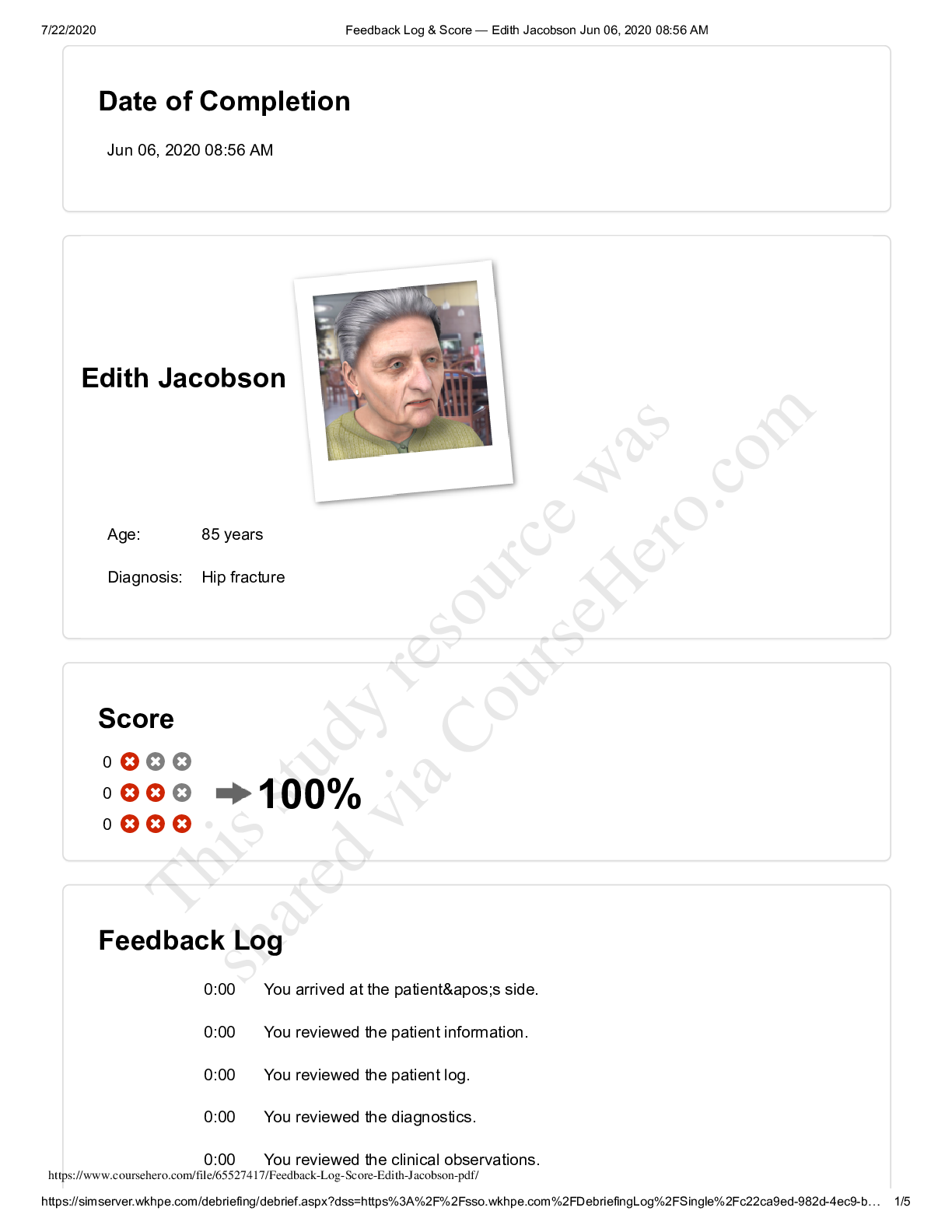


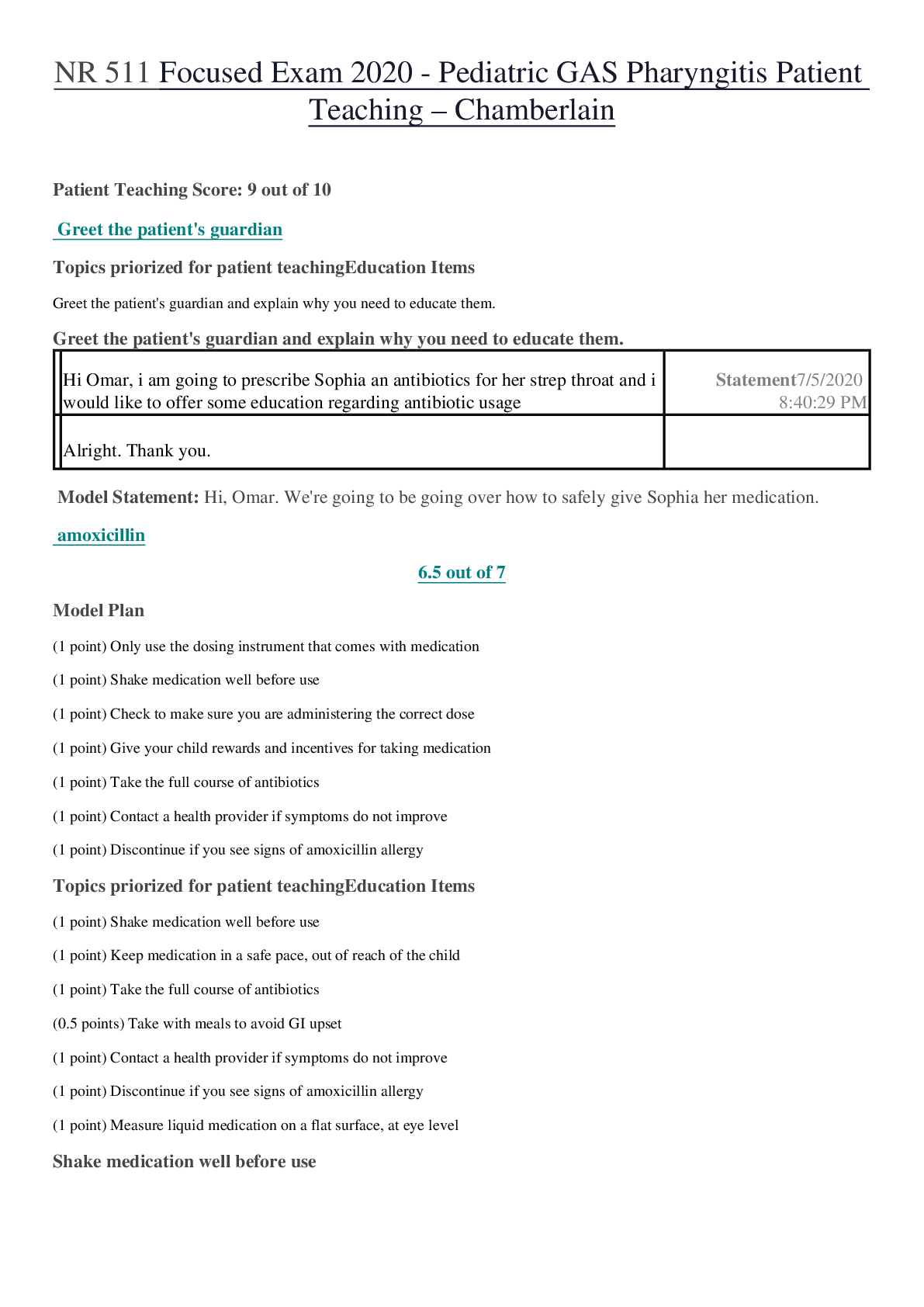
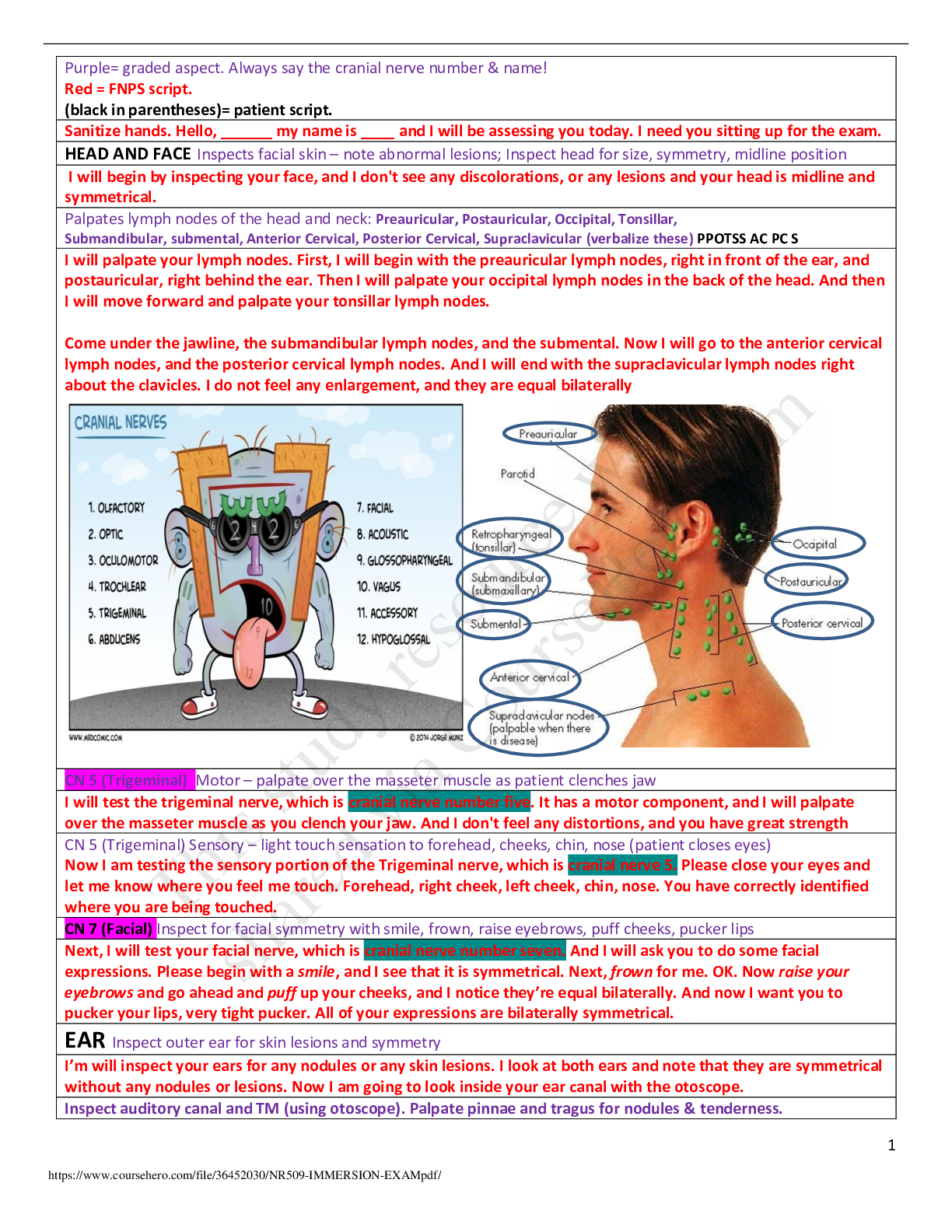
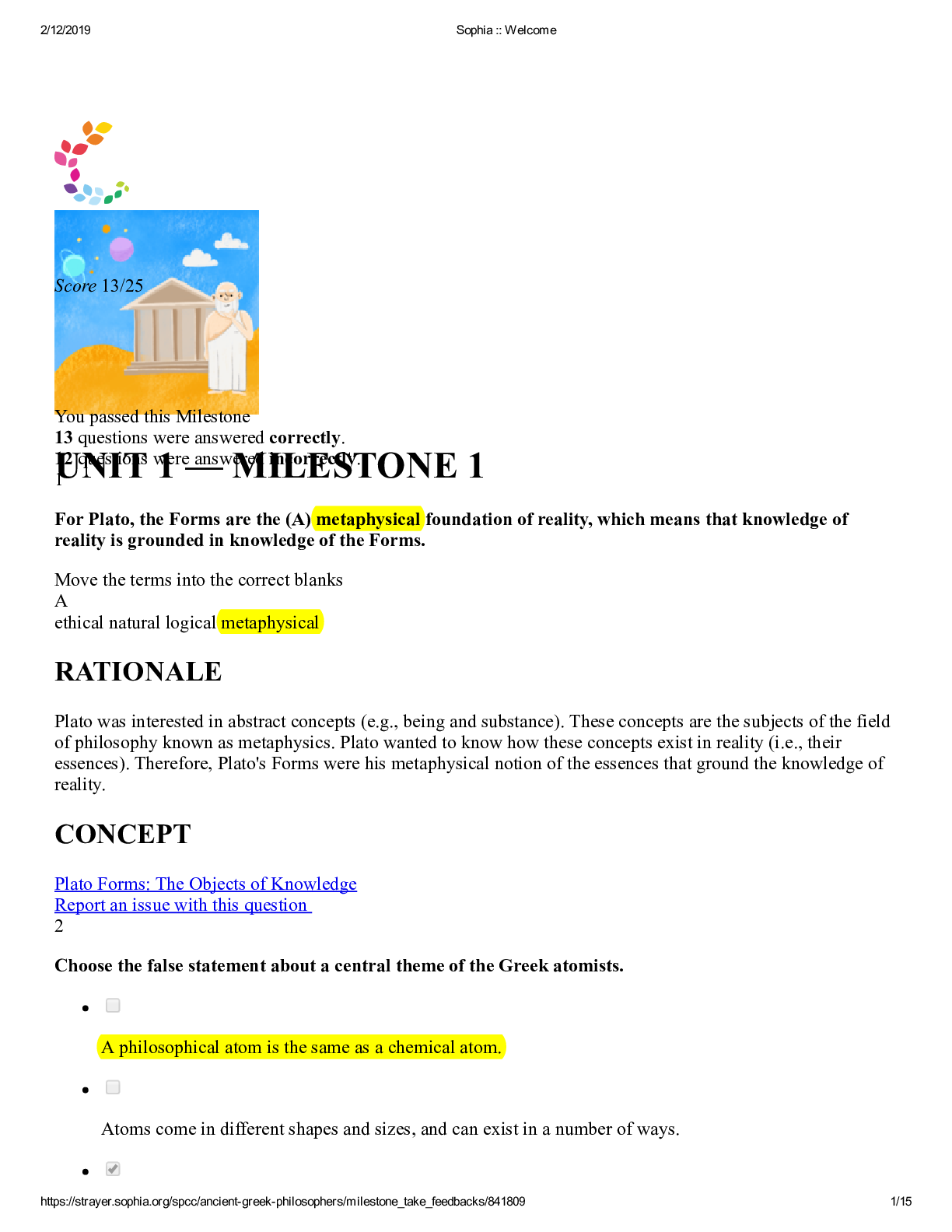
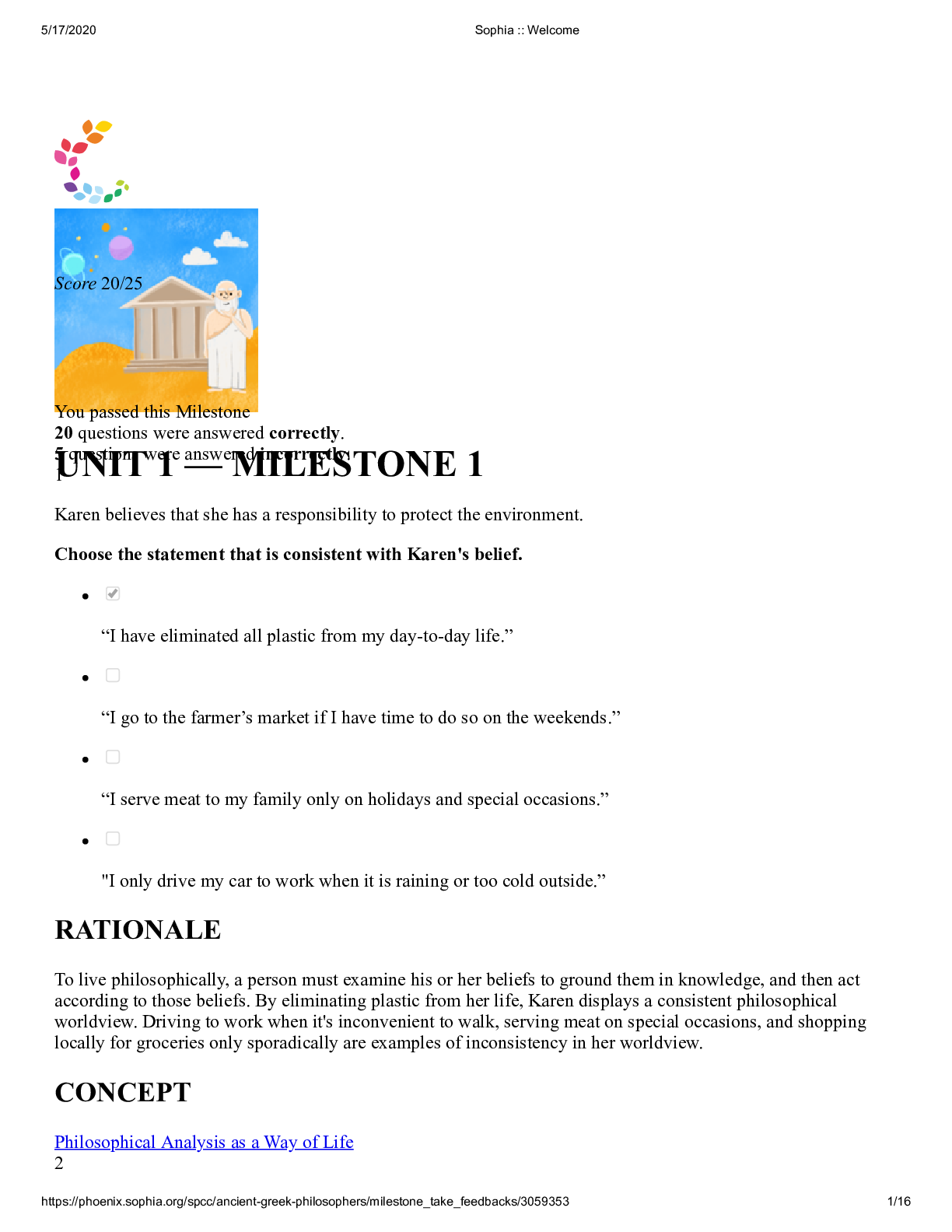

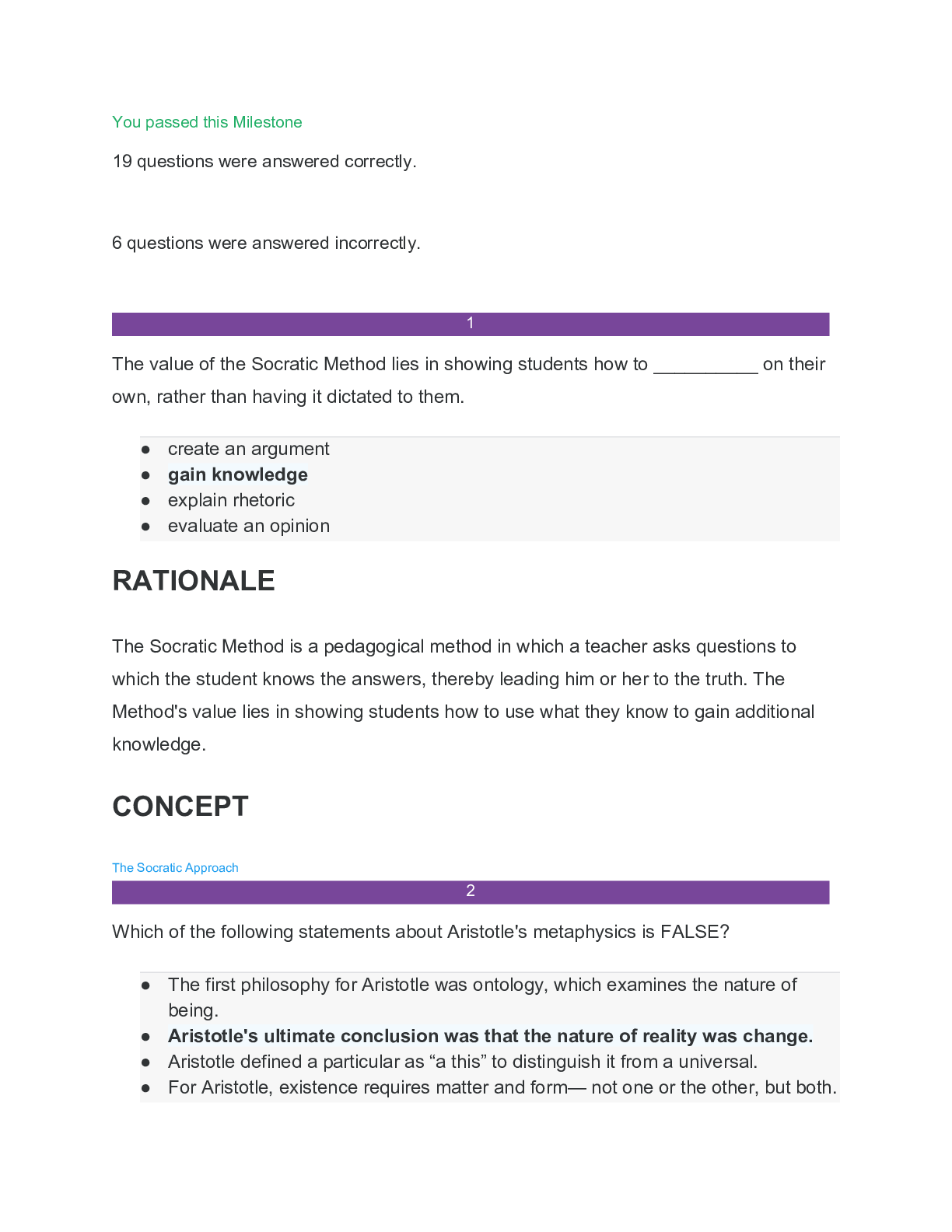
 - DeVry University.png)
